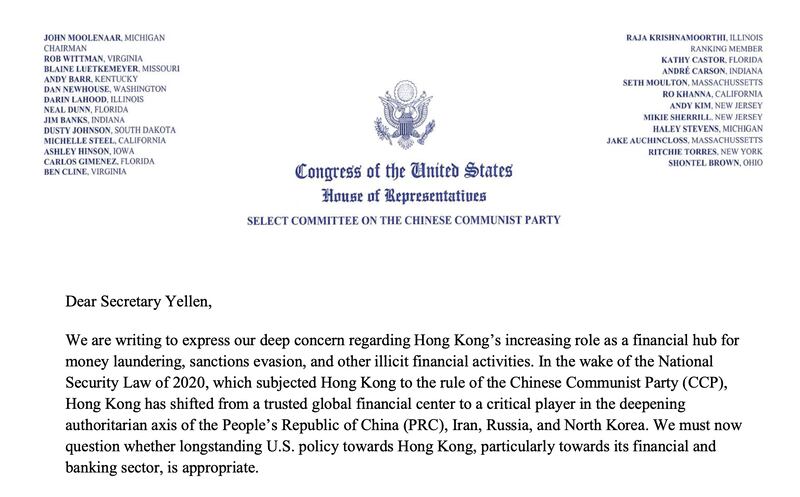美國眾議院「中國共產黨問題特別委員會」的兩黨領導人周一(25日)早上去信財政部長耶倫,呼籲重新評估香港與美國之間在銀行系統的特殊關係,稱香港正日益成為洗錢和規避制裁的中心,助長破壞美國利益的金融犯罪行為,並形容該問題為「緊急議題」(urgent issue)。
國會:香港如今已成為協助俄羅斯的全球領先者
在致耶倫的信中,眾議員穆納理(John Moolenaar)和克里希納莫提(Raja Krishnamoorthi)指出,香港如今已成為協助俄羅斯的全球領先者;多家香港註冊公司和居民參與了多項非法活動,包括向俄羅斯進口被禁止的西方技術、設立空殼公司購買禁運的伊朗石油、促進俄羅斯黃金的貿易,以及管理與北韓進行非法交易的「幽靈船」,因此遭到美國財政部制裁。

近期研究顯示,2023年從香港運往俄羅斯的貨物中,近40%屬於美國和歐盟列為「共同高優先級項目」的清單,其中包括半導體及其他俄羅斯在烏克蘭戰爭中急需的技術。
公開信說: 「香港已從一個受信任的全球金融中心,轉變為中國、伊朗、俄羅斯及北韓之間日益加深的威權聯盟中的關鍵角色。我們現在必須質疑,美國對香港長期以來的政策,特別是針對其金融和銀行業的政策,是否仍然適當。」
委員會表示,鑒於這些日益嚴重的問題,要求美國財政部官員向委員會簡報,說明美國與香港銀行間的運作關係,美國政策如何因應香港地位變化進行調整,並要闡述財政部應對這些風險的措施。信中特別提到,美國國會希望了解財政部將如何進一步通過香港金融體系,打擊不斷升級的洗錢和逃避制裁行為。
上周香港法院就47人案作出判刑,在同一時間,在香港政府主辦的國際金融領袖投資峰會上,多位全球金融界領袖出席,包括高盛董事長戴維·所羅門(David Solomon)、花旗集團首席執行官范潔恩(Jane Fraser)和道富集團首席執行官羅納德·歐漢利(Ronald O’Hanley)。此外,滙豐銀行、法國巴黎銀行等機構的高層代表也參加了此次峰會。參加者並未在峰會的討論環節中公開提及相關法院訴訟。
國會點名批評李家超對美國的敵視態度
另外,公開信又提到,自1997年以來,美國根據《美港政策法》對香港提供特殊待遇,使其享有與中國內地不同的地位。然而,自2019年民主活動遭鎮壓後,香港被中國政府全面控制,並對司法獨立及公民自由設定了新的限制,進一步削弱了香港的自治權。同時,香港行政長官李家超對美國制裁的批評態度,例如他說過美方的行為是「野蠻」、「在我本人來說是嗤之以鼻」,委員會認為,李家超這些回應進一步削弱了外界對香港銀行監管及反洗錢規則的信任。
部分香港銀行仍未達美國監管要求
據美籍律師貝祺森(Samuel Bickett)所知,部分香港銀行正配合美國財政部遵守制裁命令,但並非所有銀行都達到要求,所以他認為,公開信的主要目的是促使國會立法,確保美國各行政部門擁有足夠資源來有效執行制裁令。
貝祺森說:「這是國會議員、委員會以及包括我所合作的倡導組織在內,持續努力的一部分,目的是推動解決方案,彌補在香港及其他地區執行制裁上的重大漏洞。美國在制裁執行方面的力度確實不足,我所指的不僅是漏掉了一些規避制裁的公司。香港、中國及其他地區絕大多數規避制裁的公司和個人都未被追查到,執行制裁的資源也遠遠不足。」
美國國內要求重新審視香港特殊金融與貿易地位的呼聲日益高漲。上周四(21日),美國財政部決定對俄羅斯的「天然氣工業銀行」(Gazprombank)及其六家海外子公司,包括位於香港的GPB Financial Services Hong Kong Limited,實施制裁。美國財政部表示,俄羅斯政府利用「天然氣工業銀行」購買軍事物資以支援對烏克蘭的戰爭,並透過該銀行支付軍人薪資,包括戰鬥獎金和對在俄烏戰爭中陣亡的士兵家屬提供賠償。
上星期美國國會下屬的「美中經濟與安全審查委員會」(U.S.-China Economic and Security Review Commission,簡稱USCC)發布年度報告,首次明確建議國會取消中國自2001年加入世界貿易組織(WTO)以來享有的「永久正常貿易關係」(PNTR)。報告指出,中國未履行開放市場和促進公平競爭的承諾,提出多項可能徹底改變美中經濟與技術競爭格局的政策建議。
編輯:溫曉平
「中國共產黨問題特別委員會」去信財政部長耶倫全文:
Dear Secretary Yellen,
We are writing to express our deep concern regarding Hong Kong’s increasing role as a financial hub for money laundering, sanctions evasion, and other illicit financial activities. In the wake of the National Security Law of 2020, which subjected Hong Kong to the rule of the Chinese Communist Party (CCP), Hong Kong has shifted from a trusted global financial center to a critical player in the deepening authoritarian axis of the People’s Republic of China (PRC), Iran, Russia, and North Korea. We must now question whether longstanding U.S. policy towards Hong Kong, particularly towards its financial and banking sector, is appropriate.
The United States has long afforded preferential treatment under the law to Hong Kong. Upon Hong Kong’s return to the PRC in 1997, the United States-Hong Kong Policy Act specified special status to treat Hong Kong separately from Mainland China for matters concerning trade export and economic control. This law allowed the United States to continue to fulfill its obligations to Hong Kong under international agreements regardless of PRC participation, with provisions that such status may be revoked were Hong Kong’s autonomy from the PRC to be degraded. While this policy was adhered to in the initial decades following Hong Kong’s handover, posture began to shift following the crackdown on pro- democracy protests beginning in 2019.
This shift was catalyzed following the CCP’s July 2020 imposition of the Hong Kong National Security Law, that effectively subjects Hong Kong to PRC control. PRC authorities can now act with near impunity in Hong Kong, setting new standards on civil liberties, legal proceedings, and judicial powers. The Beijing-controlled Hong Kong Legislative Council further expanded government and CCP control with the 2024 passage of Article 23, which grants new powers to investigate and prosecute vaguely defined offenses such as external interference and the endangerment of national security with punishment of up to life in prison.1
In response to these actions, the Secretary of State of both the current and former U.S. administration have declared, as outlined in the Hong Kong Policy Act, that Hong Kong lacks the promised degree of autonomy to justify treatment separate from that of the PRC.2 These declarations have been further coupled with a slew of new U.S. policy. The Hong Kong Autonomy Act of 2020 directs the imposition of
sanctions on officials and entities in Hong Kong and the PRC that are deemed to be violating Hong Kong’s autonomy, with explicit reference to financial institutions doing business with these persons or entities. Likewise, Executive Order 13936 gives the Departments of Treasury and State the authority to sanction foreign persons who threaten or undermine Hong Kong’s autonomy, the revocation of Hong Kong’s licenses under the Export Administration Regulations that are not available to the PRC, and the provision that Hong Kong be treated that same as the PRC by the Committee on Foreign Investment in the United States’ annual reporting.
Related to these developments, Hong Kong Chief Executive John Lee, the city’s top public official, stated in 2022 that the threat of U.S. sanctions is a “barbaric act,” with “no legal basis,” and the Hong Kong government’s position is to “laugh off the so-called sanctions.”3 Statements and actions such as these may severely undermine confidence in Hong Kong’s banking regulations and know-your-customer (KYC) rules, which were once considered reliable. The heightened risk of sanction evasion and potential abuse of the financial system underscore the need for greater scrutiny and diligence.
Your department has taken preliminary action against entities based in Hong Kong, where the city has now become a global leader in practices such as importing and re-exporting banned Western technology to Russia, creating front companies for purchasing barred Iranian oil, facilitating the trade of Russian- sourced gold, and managing "ghost ships" that engage in illegal trade with North Korea.4 Recent research revealed, for example, that nearly 40 percent of goods shipped from Hong Kong to Russia in 2023 were on the US and EU list of ‘common high priority items’—semiconductors and other technology that Russia most needs for its war in Ukraine.5
Given these escalating concerns, we request that the appropriate U.S. Treasury Department official brief the Select Committee on the current status of American banking relationships with Hong Kong banks, how our policies have shifted to account for the changes in Hong Kong’s status and posture, and the measures the Treasury plans to implement to address these risks. Specifically, we are interested in understanding how the Treasury intends to further combat the facilitation of money laundering and sanctions evasion through Hong Kong's financial system.
Your leadership in this matter is crucial for safeguarding our financial system and upholding the integrity of international banking practices. We look forward to your response and any insights you can provide regarding the Treasury’s strategies and actions related to this urgent issue.
Thank you for your attention to this important matter.
Sincerely,
John Moolenaar
Chairman
House Select Committee on the CCP
Raja Krishnamoorthi
Ranking Member
House Select Committee on the CCP
